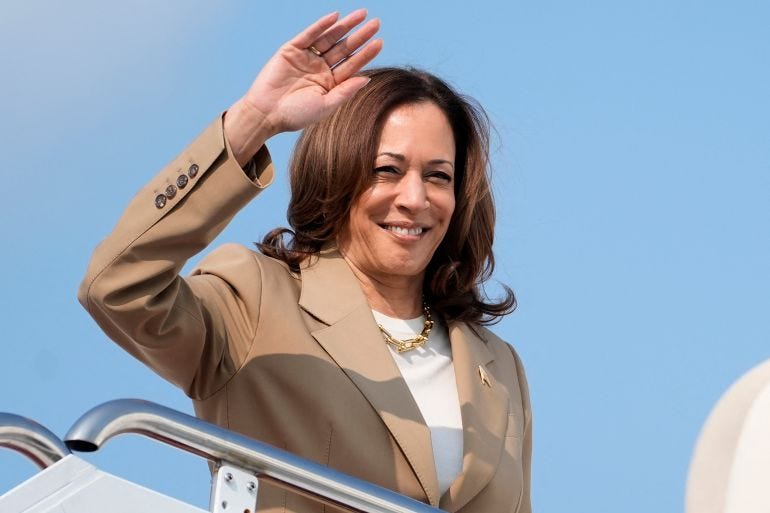Identities and elections
History and Kamala Harris
In the immediate aftermath of Joe Biden's withdrawal from the race for president, the first thing people noticed about Kamala Harris was her age. She isn't eighty or seventy or even sixty yet. With this observation came a hope among Democrats and a fear among Republicans that she will appeal to young voters.
Yet quickly people remembered that she is a woman. And black. And Asian. And questions are being asked how these aspects of her identity will affect voters. Will men be less likely to vote for her because she is a woman? Will women be more likely? Similarly for the boxes marked black and Asian.
Questions of identity have always characterized presidential elections. George Washington was a Virginian and a soldier. That he was a white male went without saying, because every other candidate was too.
This is an important point. The purpose of identity is to differentiate. We humans do it reflexively. It’s especially important in politics, where rival candidates explain how they are different from the others.
Andrew Jackson was a military hero and a westerner, when John Quincy Adams was neither. Franklin Roosevelt was not Herbert Hoover, which was all that mattered after the Great Crash of 1929.
Religion entered presidential politics as a differentiator in 1928, when Al Smith became the first Catholic to win nomination by a major party. Did it help Smith or hurt him? He doubtless lost some Protestant votes, but he certainly won a bonus of Catholic votes. More salient, most likely, was that he was a Democrat in a Republican decade.
John Kennedy won in 1960 despite being a Catholic. Or was it because he was a Catholic? Hard to tell. He was also more telegenic than Richard Nixon. Was that the difference in the close race?
Race became an issue in 2008. Some people voted against Barack Obama because he’s black. Arguably more people—of various races—voted for him for the same reason.
Hillary Clinton lost votes in 2016 for being a woman. But she gained other votes on that account. More than she lost? Hard to say.
In the aftermath of that election more than a few disappointed Democrats complained that America just wasn't ready for a woman president, by which they often meant that misogynist males still have a stranglehold over American politics. That was probably an overinterpretation. First, because Clinton might have won more votes for being a woman than she lost.
Second, she is a Democrat, which was more salient to most voters. After eight years with one party in the White House, voters were ready for a change. This has been the norm in American politics since the early twentieth century. To buck the general trend would have required an unusually charismatic candidate, which Clinton was not.
This is the lesson for Kamala Harris, if there's any lesson at all. Be as appealing a candidate as you can be. Don't worry about losing votes because of something you can't change, because in the end you might not lose more than you gain.
It sounds superficial to say that the engaging smiles of JFK and Obama mattered more in their elections than religion or race. But on balance it's not outlandish.
At their heart, presidential elections are popularity contests. Donald Trump's supporters often don't know what his policies are, not least because many of those policies are vague and changeable. But they like him for the anger and disdain he shows for people and institutions they don't like.
With Trump having claimed the angry corner, Harris can position herself as the happy warrior. The positive energy she’s channeled at recent rallies is a good start. Many people like to be angry. But more people like to be happy.
FDR pulled it off. So did Ronald Reagan and Bill Clinton. Their politics were very different, but their personal styles made Americans feel hopeful about their country and about themselves.
In politics that personal connection is the most potent identifier of all.


Brands writes: "In politics that personal connection is the most potent identifier of all." It reminds me of a quote from a book on Roman history I read years ago. It went something like "Caesar Augustus (Octavian) could make a friend by the way he told someone no. Tiberius could make an enemy by the way he told someone yes." As a retired professor (albeit not in Brands' league - an understatement), I can say this is true in academia, too. A colleague of mine once said: "The most important thing in academia is how you get along with your colleagues. When someone doesn't get tenure or if on a temporary contract, doesn't get his/her contract renewed, it's normally because s/he rubbed his/her colleagues the wrong way."
Excellent article!